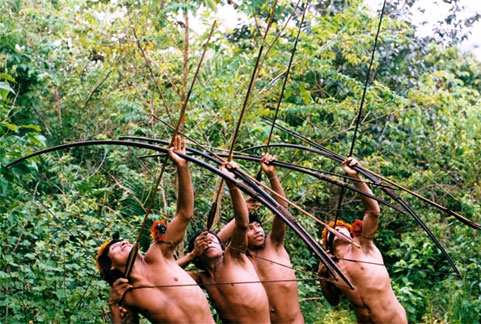|
Indegenous peoples insist
on equality of all rights
By Rizwy Raheem
Indigenous peoples, many who are victims of armed conflicts, corporate greed and
rising economic inequalities, want greater participation in the United Nations
while also calling to the international community to address their grievances.
|

The Awa tribe in Brazil has the dubious distinction of being
the most threatened tribe on Earth. |
NEW YORK (IDN) - The world’s indigenous peoples - estimated at over 370 million
living across 90 countries and accounting for 15% of the poorest - remain
isolated, both politically and geographically.
So, nearly a thousand participants from Asia, Africa, North America, Europe and
Latin America and the Caribbean gathered together to air their grievances before
the United Nations at a two-week long conference, which concluded May 20.
Their plea for inclusiveness was a reiteration of Secretary-General Ban Ki-moon’s
appeal to the international community on the UN’s 17 Sustainable Development
Goals (SDGs) for a more humane and prosperous world for all - “leaving no one
behind”.
The conference ended with a resounding call for greater participation in the
United Nations and in UN bodies by some of the world’s most neglected minorities
who are increasingly victims of armed conflicts, corporate greed and rising
economic inequalities.
Since the establishment of a UN Permanent Forum on Indigenous Issues in 2000,
and despite a UN Declaration on the Rights of Indigenous Peoples adopted by the
General Assembly in 2007, indigenous groups have expressed great concern over
the growing number of military conflicts affecting them worldwide.
The most affected are indigenous people caught in crossfires in current and past
armed conflicts in Colombia, India, Myanmar, the Philippines, Bangladesh,
Guatemala and Peru, according to Victoria Tauli-Corpuz of the Philippines, the
UN Special Rapporteur on the Rights of Indigenous Peoples.
The grave consequences include forced displacement, extra-judicial executions,
sexual violence and forced recruitment of child soldiers.
“The violations against indigenous peoples in the context of armed conflicts
cause trauma and irreparable harm, destroy their culture and rip apart the
social fabric of the affected indigenous communities,” she declared. Not
surprisingly, the theme of the conference was: “Indigenous Peoples: Conflict,
Peace and Resolution.”
According to the United Nations, extractive industries, including mining oil
palm plantations and the construction of dams, often take place without the
free, prior and informed consent of indigenous peoples.
During violent conflicts, indigenous peoples are often among the most vulnerable
due to situations of poverty, political marginalization and systemic
discrimination that many still face.
At the conclusion of the meeting UN Secretary-General Ban Ki- moon admitted that
while much has been achieved to improve the rights of indigenous peoples,
conflicts on their lands and territories, and the lack of inclusion of their
voices in peace processes, remain a challenge.
He called on all Member States and the entire UN system to work together to
address these and other serious concerns. Stressing that indigenous peoples are
firmly on the UN agenda, and were fully engaged in negotiations for the 2030
Agenda for Sustainable Development and the Paris Agreement on climate change,
“it is now crucial that they also participate in and contribute to
implementation and follow-up”.
Ban urged indigenous peoples to remain engaged and actively participate in the
process initiated by the President of the General Assembly to enable their
representation in meetings of relevant UN bodies.
Briefing reporters May 19, Alvaro Esteban Pop of Guatemala, Chair of the Forum,
said that among the most significant topics discussed during the session were
peace and conflict resolution; the issue of children and women in situations of
violence; and the persecution of leaders involved in conflicts over land and
natural resources.
“These are fundamental aspects of any negotiation and any region in the pursuit
of resolutions and peace therein,” he stressed.
Pop said while dialogue had not been easy over the last two weeks, it was
absolutely necessary to be able to continue working together.
“Every day we learn more,” he added. He said many indigenous speakers had
described the serious situation of their respective people, in particular their
struggle to access land and resources, the violence and abuse suffered by
indigenous women and girls, and their lack of access to health and education.
Indigenous women had made their “voices of protest heard”, he noted. Also, the
high rate of suicide among indigenous youth, which related to colonial
injustices of the past, was simply unacceptable, he declared.
– Third World Network Features
|

